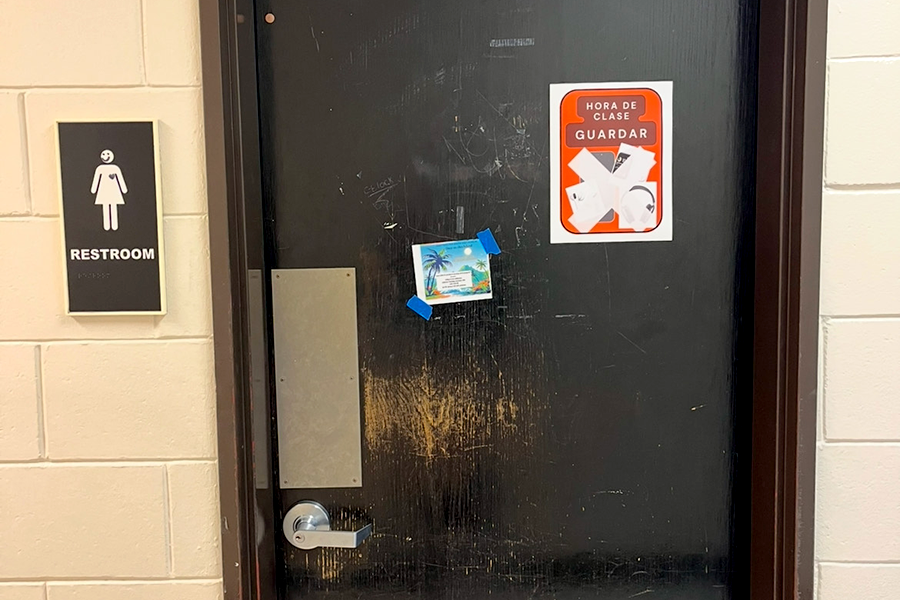Members of the mental illness awareness student group Silver Ribbon Campaign (SRC) are looking to show how mental illness is a relevant issue in South’s community.
In the past, the vast majority of SRC speakers have come from outside the school, but this year, several South students have stepped forward to share their stories at SRC meetings and spread understanding throughout the student body.
Last year, approximately one in five people in the United States suffered from a mental illness and more than 2 million teens experienced a major depressive episode, according to the the Substance Abuse and Mental Health Services Administration. These numbers don’t include the estimated 60% who never reached out for treatment.
Reaching out for help is considered one of the hardest parts of recovery from a mental illness.
The false belief that depression only affects the weak-willed, a misconception often addressed by student speakers, has made it difficult for some to admit they may be suffering from a mental illness or prevents them from seeking help.
This false idea can be eradicated by educating people on the facts of mental illness, but there are other factors that are propelling this stigma, and many South students are completely unaware of them.
Phrases like “wow, they’re so anorexic/bipolar/depressed”, even words like insane or psycho, if used in a negative context could be very damaging.
These and other phrases have become relatively common in many conversations and can undermine the process of recovering from a mental illness.
One of the SRC student speakers, junior Jessica Cardarelle, explained that these phrases unintentionally promote negative stigma about mental illness and often leave a greater impact than most would believe.
“South should know it’s not okay to joke about being depressed, bulimic, anorexic, or suicidal. It makes me and lots of other students feel like their experience is invalidated and a joke,” said Cardarelle.
Because of SRC’s expanding popularity, lots of students have been able to experience some very informative meetings with adult guest speakers, but some believe that having student speakers has made the biggest impact on SRC members.
Junior Jackson Kendall, a regular attendee of SRC meetings, said, “The student speakers really make you understand their experiences a lot more. These are people I talk to and see everyday. I can really relate to them.”
Another SRC member, senior Hugh Nelson, was comfortable enough in a meeting with a student speaker to bring up his own experience with depression.
Nelson explained, “I wouldn’t have opened up like that in another meeting, I knew [the student speaker] was an easy person to talk to and share with.” But Nelson said he still isn’t sure whether having student speakers at SRC is a positive choice.
“The upside to having professional adults speak is that they have years of experience and knowledge, but [the student speaker] was able to connect to the students better than the adults.”
Although Nelson believes the meeting might have been contrary to one of SRC’s goals to give people with mental illness hope for the future and recovery, he stated, “The student speaker meetings are more powerful than a lot of other meetings.”
Social worker and SRC facilitator Eva Neubeck believed the reason student speakers have left such a large impact on some SRC members was “because of their ability to relate to and create a comfortable environment for the students who attend SRC meetings. The speakers use words and humor students are familiar with. They’re part of South’s community and students really respond to that.”
Neubeck explained that, “most of the time students come up with the idea of wanting to share their story themselves. They want to help their peers fully understand.”
Although most mental illnesses are very complex and very individualized, allowing students to speak to their peers has been a very successful way of spreading understanding about these medical conditions.
“The speakers are there to make the community feel comfortable, and make students understand that support is always there if they or a loved one need it, and allow them to really ask questions,” Neubeck explained.
The number of questions asked during meetings with student speakers was an undeniable sign that students attending the meetings felt more comfortable around the student speakers.
Although having student speakers can be an impactful experience for the students listening, the job of speaking and putting your life on the table in front of your peers was a daunting task for some of the SRC student speakers.
Cardarelle was the first student speaker this year, and said that the night before she “got so stressed I almost cancelled, but I’m so glad I didn’t.”
The idea of speaking at an SRC meeting was initially brought up to her by a close friend and she considered the idea all summer. Cardarelle then proceeded to talk about the idea with her therapist.
“My therapist said she was there trying to help change the world one person at a time, I thought that this would be my chance to help but with 150 people instead,” Cardarelle explained.
Cardarelle prepared thoroughly with notes and practice, but stated, “I was still terrified. When I spoke I was shaking and pretty close to crying, but after I was so relieved.”
Her goal in speaking was to make sure students knew that “an eating disorder can affect anyone, even people who aren’t considered thin,” Cardarelle said, adding that “happiness is way more important than the size of your clothes.”
The message was heard, and after speaking, Cardarelle was congratulated by many students.
“A lot of people came up to me and told me that what I did was really brave and cool which was really nice,” she explained. “My biggest fear was that all the people who didn’t know until then would change and treat me differently, but so far that hasn’t happened.”
Clara Schultz, a senior and an SRC leader, explained that the positive reception was due to how comfortable the students felt around both speakers.
“The kids who come know the student speaker, understand and relate to the way they talk, and respect how brave they are to open up. This leads to people being more comfortable and able to ask questions… They’re very successful meetings,” Schultz stated.
The positive reaction to these student speakers by South’s community has prompted more students and SRC leaders to continue encouraging student speakers in the future.
The next speaker, SRC leader and junior Kyra Hood, was inspired to sign up “because of the impressions left by student speakers in the past.”
She is hoping to send the message that “students have someone to reach out to if they need it. Mental illness can change some behaviors and outlooks, but we’re all still the same, we’re still members of society and real people.”







